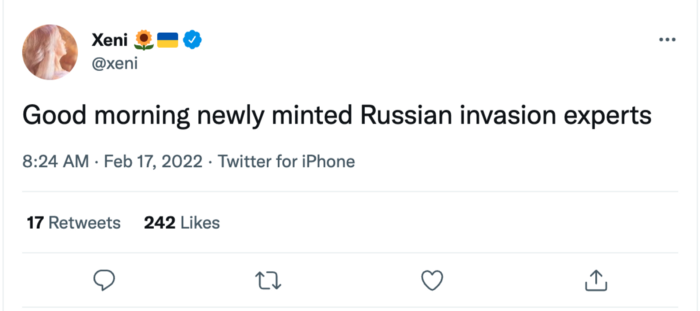
I didn’t post anything here last week. I didn’t release my regular podcast episode, either. On the one hand, it was a matter of reading the room: when something truly awful is happening, the best course is usually to pause. Of course, that doesn’t stop clueless marketers from continuing to post their bright and cheery messages about discounts on luxury goods, or startups from congratulating themselves that their subscription targets have been met — but I try to tell myself those are scheduled tweets that no one thought to pull from the automated calendar.
Even that tone deaf activity, however, is better than the race to post the best hot take on an unfolding crisis itself. Since when is any of us an expert on Ukraine? As Xeni Jardin tweeted on the day the war began, “Good morning newly minted Russian invasion experts.” Yes, she was being facetious, warning us all in advance of the imminent onslaught of uninformed but vociferously expressed arguments for why NATO or Biden or Obama or Clinton or China or Woodrow Wilson or the World Bank or cryptocurrency should or should not be blamed for the bloodshed.
I received as many messages asking me to share my own take as I did during Biden’s supposedly botched withdrawal from Afghanistan. But just as I have very little expertise in the logistics of war withdrawal, I don’t really know more about the history of the NATO alliance or Western pressure on Russia than I can glean from the New York Times, Oliver Stone’s Putin Interviews, or a few decades of watching PBS Frontline. I’m honored that publications want to platform my views, but I get the feeling they care less about someone making sense of the crisis than having someone fill the space they’re obligated to spend on it. Ukraine will get hits. Gotta do it. And if they’re lucky, the writer will say something controversial enough to generate heated debate on the social networks — whether or not it’s bringing any new information or a framework for understanding events as they unfold.
If anything, a crisis like this demands the very opposite effort. Instead of filling our channels and brains with uninformed opinions, we should stop and breathe. We are not there, we not informed, and we should shut up — except, maybe, to stand in solidarity with our fellow human beings. We can bear witness to what is happening. Instead of adding more conflict and confusion to the crisis, we can help metabolize the trauma of our fellow beings. We are all connected, after all. As polyvagal theory suggests, human beings share one big collective nervous system. If we are not being shot at or shelled ourselves, we can help process what the rest of us are going through. This is real. It doesn’t mean closing our eyes, minds, or hearts from what they’re going through, but opening to it — without the temporary stress relief of posting a hot take.
Sure, we can still do stuff. In this case, the best thing we can do to relieve global stressors on the conflict would be to use less oil. Not just less gasoline, which accounts for maybe 40% of oil consumption, but plastic and asphalt and energy of all sorts. The single best thing most of us can do to help Ukraine and the rest of the world is to consume less. Don’t drive, walk. Don’t shop, socialize. Don’t buy that minimum viable product excuse for a drill at Home Depot, but borrow a real one from your neighbor and share something back in return.
We can also donate directly to organizations with proven track records in providing aid to war zones, rather than retweeting the latest pop-ups on GoFundMe, which may not be outright scams, but may be less likely to understand all of the logistics involved in bringing food and medical supplies across landscapes that have become battlefields. I donate to AfyaFoundation.org, an organization run here in Yonkers, New York by a superhero neighbor of mine, and has been delivering whole shipping containers of medical supplies to disaster and war zones for decades. Or if want to assist the Ukrainian war effort directly, there’s Defending Ukraine Together, a project of the NGO Come Back Alive, which is being pretty transparent about where the money goes.
In short, it’s okay to sit and stay with the horror that is the war in Ukraine. You don’t have to have an opinion beyond whatever you are feeling right now. The temptation to say more than the obvious is being driven by a media system that profits off this compulsion, and only makes things worse in the process.
Don’t add fuel to that fire.